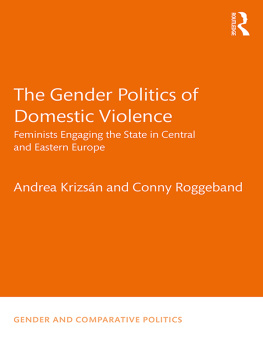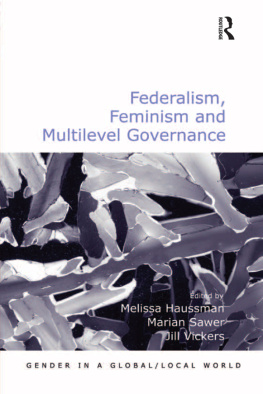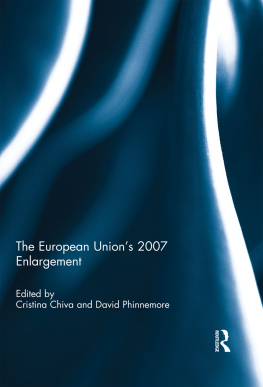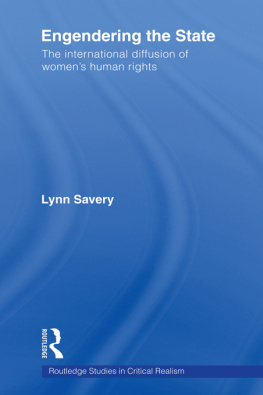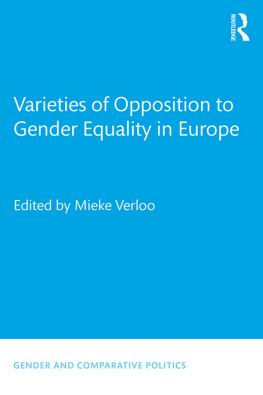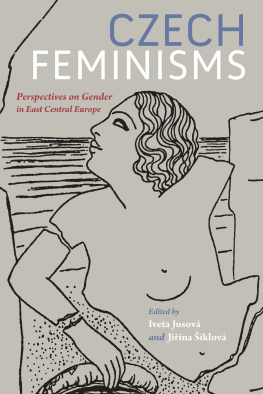Published by State University of New York Press, Albany
2015 State University of New York
All rights reserved
Printed in the United States of America
No part of this book may be used or reproduced in any manner whatsoever without written permission. No part of this book may be stored in a retrieval system or transmitted in any form or by any means including electronic, electrostatic, magnetic tape, mechanical, photocopying, recording, or otherwise without the prior permission in writing of the publisher.
For information, contact State University of New York Press, Albany, NY
www.sunypress.edu
Production, Jenn Bennett
Marketing, Michael Campochiaro
Library of Congress Cataloging-in-Publication Data
Avdeyeva, Olga A., 1976
Defending womens rights in Europe : gender equality and EU enlargement / Olga A. Avdeyeva.
pages cm
Includes bibliographical references and index.
ISBN 978-1-4384-5591-4 (hardcover : alk. paper)
ISBN 978-1-4384-8 (ebook)
1. Women's rightsEuropean Union countries. 2. Sex discrimination against womenEuropean Union countries. I. Title.
HQ1236.5.E85A93 2014
305.42094dc23 | 2014020292 |
10 9 8 7 6 5 4 3 2 1
Acknowledgments
I am grateful to so many people who helped me and encouraged me at different stages of this project. I have had many mentors. In graduate school, seminars with Laurel Weldon and Patricia Boling encouraged my interest in womens rights and made me aware of multiple barriers to achieving gender parity. They taught me to think critically about the impact of public policies on the opportunities of people, men and women, to advance in education, careers, and politics. I learned that the life chances of people are not random; they are structured by a deep gender divide which greatly impacts our life opportunities. Interactions with such scholars as Aaron Hofmann and Ann Clark led me to ask questions about the role of external actors in shaping states behavior. This book developed from my initial interest in how international norms on womens rights encourage states to change domestic policies in support of working women. With time, this project grew into a larger inquiry about the mechanisms that international actors use to influence domestic politics.
I was fortunate to have encouraging and enthusiastic scholars on my dissertation committee. Perhaps they did not realize it, but my advisors encouraged me to elaborate this project in opposite directions: while Laurel Weldon and Rosalee Clawson recommended exploring a broader range of cases, Oxana Shevel and Robert Bartlett advocated a more nuanced and fine-grained analysis of a limited set of states. I have always kept this advice in my mind. In my dissertation and in this book, I try to strike a balance between these two goals by grounding my large n-statistical comparative analysis in detailed and nuanced case studies. My gratitude goes to my advisors. Most of all, Laurel Weldon has been a steadfast, forthright, and caring advisor. Always offering solid constructive advice, she has been an intellectual role model whose contribution went far beyond the obligations of a dissertation advisor. She introduced me to a field of gender and politics and to a world of the best feminist scholars. I also owe a special thanks to Amy Mazur for her confidence in me, her support and encouragement of young scholars and graduate students, and her willingness to read through some of the earlier drafts of this project. Amy is integrity defined.
Many of the ideas that appear in this book developed during the course of conversations at various conferences and workshops. I am tremendously grateful to many people who shared their ideas with me: Liza Baldez, Lee Ann Banaszak, Karen Beckwith, Christina Chiva, Katalin Fabian, Emilie Hafner-Burton, Mala Htun, Janet Johnson, Dorothy McBride, Celeste Montoya, Mark Pollack, Leigh Raymond, Meg Rincker, Aili Marie Tripp, Georgina Waylen, Christina Wolbrecht, and Kathrin Zippel. I received invaluable comments on early drafts of this work from the discussants at the American Political Science Association in August 2011, Midwest Political Science Association in April 2012, and the European Conference on Politics and Gender in March 2013.I am also indebted for comments and suggestions from the participants of Purdue Workshop on Informal Institutions and Intractable Global Problems held in West Lafayette in April, 2013. I was very fortunate to be part of the workshop, and my book benefited tremendously from the advice, questions, and encouragement I received. My special thanks go to my editor, Michael Rinella, and two anonymous reviewers who saw the value in this manuscript and helped me make this book a reality.
I would like to thank my colleagues at Loyola University Chicago for their interest, questions, and support of this endeavor. My special thanks go to Richard Matland, a good friend and colleague, with whom we spent long evenings talking about politics and Japanese cinematography in Siberia, Russia. Thank you for encouraging this project and always reminding me that smart women should be confident in what they do. David Doherty walked me through the mazes of statistical analysis and helped me to develop a model for this research, while correcting multiple mathematical errors I made; thank you for your patience and advice! My conversations and friendship with Molly Melin and Alex Grigorescu have inspired my work and helped me cope with the multiple competing tasks a young professor faces: doing research, writing, teaching, and raising children. Your friendship is very important to me and I greatly value our conversations. Vince Mahler read first drafts of this book and Raymond Tatalovich read the final version of the manuscript. I deeply appreciate your comments and suggestions!
This project would not be possible without support of my dearest friends, Sangmin Bae, Martyn De Bryn, Germano Franzoni, Inna Hannan, Evie Malaia, Mariya Omelicheva, Anna Pak Burdin, Kate Ralston, Sarah Robinson, and Anna Sokolovska. My husband, Keith Gordon, has been an incredible partner throughout the process of writing and revising the manuscript for publication, taking up the household duties and spending time with our two little children, Gabe and Natasha. This book, though, is dedicated to my parents, Galina and Alexander Avdeev, two surgeons from Siberia, whose sole goal was to give the best to their children and support us in all our endeavors and undertakings. It is to them I am indebted for everything.



